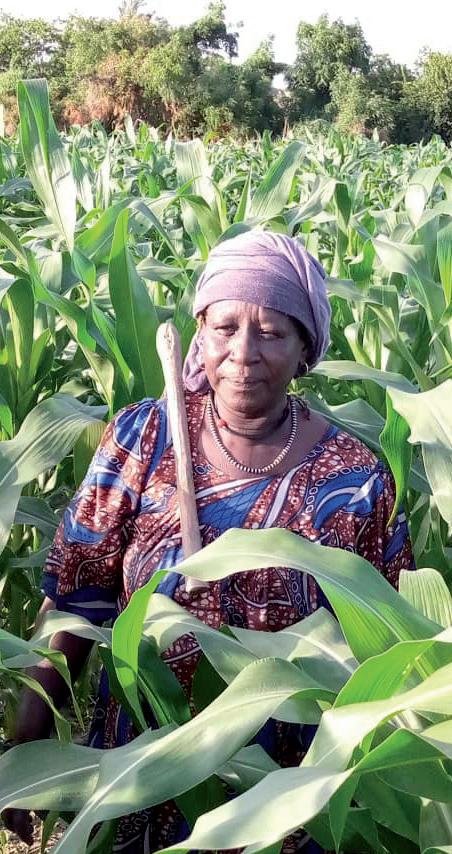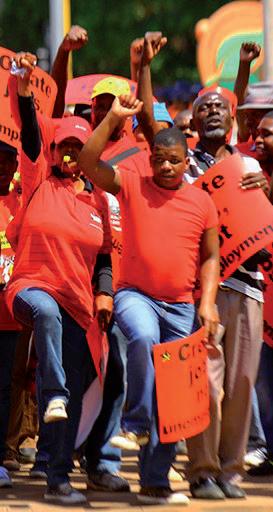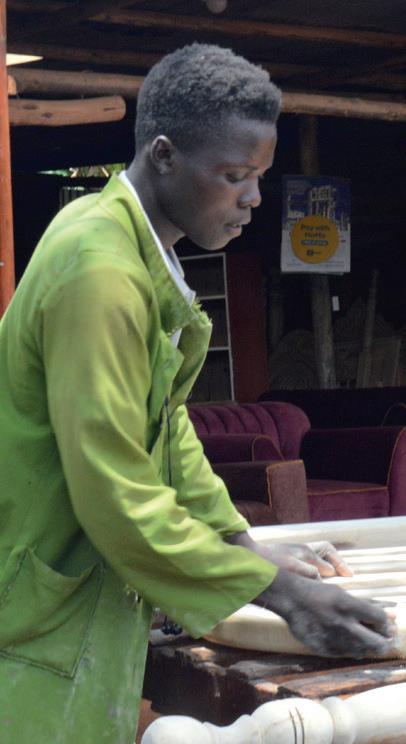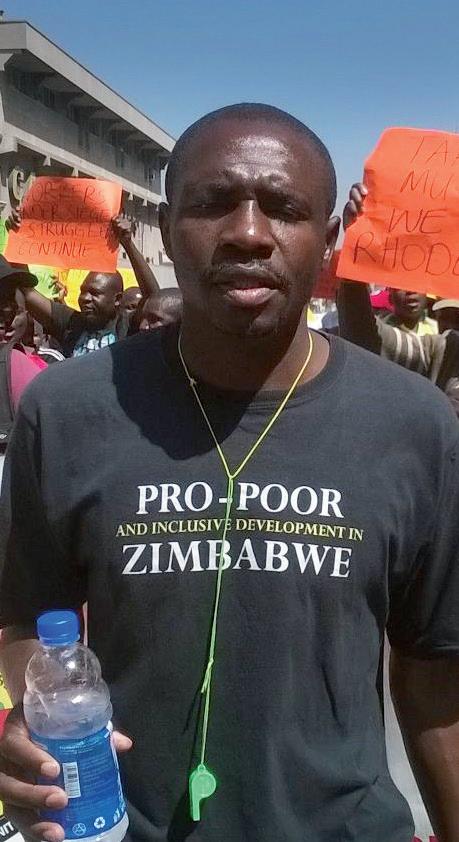










The 2024 edition of A Trade Union Take on the SDGs gives an independent, workers’ perspective on how governments are delivering on the Sustainable Development Goals (SDGs). In a context of existing structural, social, economic and environmental challenges, countries across the world continue to face significant obstacles in reaching the objectives set by the 2030 Agenda. At the same time, geopolitical interests and polarisation are severely undermining the ability of multilateralism to provide global solutions to advance social justice.
In this context, trade unions emphasise the need for a New Social Contract with SDG 8 at its core to respond to workers’ demands for decent, climate-friendly jobs with Just Transition; rights for all workers; minimum living wages and equal pay; universal social protection; equality to end all discrimination; and inclusion of all countries in decision-making processes to build a rights-based development model aligned with the SDGs.
A Trade Union Take on the SDGs compiles findings and analysis of the SDG country reports produced by trade union organisations in 13 countries in 2024: Brazil, Chad, Costa Rica, Kenya, Namibia, Nepal, Nigeria, Peru, South Africa, Spain, Tanzania, Uganda and Zimbabwe. These reports assess the transparency of government processes as well as their engagement in consultations and social dialogue with trade unions to define and implement national SDG plans. They also map countries’ efforts to reach key SDG targets. This work is an essential part of the global labour movement’s contribution to the SDGs Decade of Action.
This year’s review includes trade unions’ reporting on how their governments are responding to multiple, interlinked crises in the years following the Covid-19 pandemic: rising costs of living including food and energy prices; growing inequality; climate change and environmental degradation; and armed conflicts.
The SDG Summit, held under the auspices of the UN General Assembly in September 2023, highlighted how these crises have hindered progress towards the goals and called for urgent action. Although the SDGs are increasingly integrated into national policies, the resources to implement them remain insufficient. Recovery and resilience measures must be human-centred and funded through domestic resource mobilisation and international support. This includes clear commitments to more affordable, long-term financing within a reformed international financial system1
Decent work is a key driver for progress across all the other SDGs. Trade unions, as an organised and democratic expression of working people, are uniquely placed to help formulate, monitor and deliver policies in their countries and internationally. Yet many trade unions report that governments do not adequately include them in the design and implementation of development plans. Stronger social dialogue, based on freedom of association, the right to collective bargaining and the right to strike, is crucial to building trust and delivering equitable and sustainable policies to achieve the 2030 Agenda.
Consult the country reports produced in 2024 on https://www.ituc-csi.org/a-trade-union-focus-on-the-sdgs-country-profiles-2024
Trade unions assessed the transparency of the SDG implementation process within their countries based on two indicators: (1) their ability to access information and decision-making processes, including consultation meetings, accessibility of policy documents and the openness of relevant officials or institutions and (2) the existence of adequate reporting mechanisms.
In most of the 13 countries surveyed, trade unions reported limitations on access to information. In six of these countries, information is provided at irregular intervals or only when requested. Only two countries (Brazil and Spain) enjoy complete access to information, while in one country (Peru) there is no access at all. In addition, reporting mechanisms are often inadequate.
SDG 17 recognises multistakeholder partnerships as key to achieving the SDGs and calls on countries to set up multistakeholder monitoring frameworks that support the achievement of the goals. Trade unions have a key role to play in integrating the needs and priorities of workers and society at large into the policy-making process, ensuring that no-one is left behind.
Trade unions assessed existing SDG consultation processes in their countries, with a particular focus on the functioning of multistakeholder consultation platforms. Most of these assessments showed that unions were not included in the fora that governments had set up to monitor and implement the 2030 Agenda in their respective countries. Either there is no multi-stakeholder platform or trade unions are not included in it. In several countries, input only takes place via a national labour council. Full SDG consultation processes are in place in only three of the countries surveyed (Brazil, South Africa and Spain).
A sustainable future for people and planet can only be achieved with decent work and social justice. Social dialogue is a fundamental means of implementing the 2030 Agenda as it facilitates consensus building among governments, employers’ and workers’ organisations on policies that have an impact on decent work strategies. However, the trade union analysis reveals insufficient integration of social dialogue into national SDG planning and implementation processes.
A tripartite dialogue on the 2030 Agenda has been reported as working effectively in only three of the countries surveyed (Brazil, South Africa and Spain). Where trade unions were able to make contributions to national government, these were rarely drafted jointly with employers’ representatives (Tanzania being one exception). Furthermore, discussions usually focused on the implementation of SDG 8, rather than the 2030 Agenda as a whole. In three of the countries surveyed (Chad, Kenya and Peru), social partners were not involved at all in the design and implementation of their government’s national SDG plan.
Inequality of wealth distribution is still of concern in all the countries in this report. Progress in reducing inequality slowed and in some cases reversed following the Covid-19 pandemic.
Of the countries surveyed, eight are in sub-Saharan Africa, with income classifications ranging from low to upper middle. All these countries report significant challenges to achieving greater equality, with Chad, Uganda and Zimbabwe as examples of where the gap is widening.
Latin America is also one of the most unequal regions in the world. Of the three countries surveyed on the continent, all are classified as uppermiddle income but are still very unequal. Worryingly, trade unions report that inequality is increasing in Costa Rica (formerly one of the most equal societies in the region) and Peru.
Tackling unemployment and in-work poverty, while promoting productive employment and labour income share is key to employment quality. Unemployment levels have recovered since the pandemic in most of the countries surveyed. However, in some countries, securing employment remains a challenge with young people most affected, notably in southern Africa (Namibia, South Africa and Zimbabwe) and Nepal. Trade unions in countries such as Nigeria, Tanzania and Uganda report a reality of underemployment among the working population.
Women continue to do more unpaid work than men and experience a gender pay gap in all countries surveyed. Female representation in managerial positions or parliamentary seats has only improved in some of the countries.
Minimum wages can help to combat poverty and reduce inequality. Nepal and Spain recently increased their minimum wage. Other countries either have no minimum wage (including Namibia, Peru and Uganda) or have experienced delays in implementation (Kenya) or negotiation (Nigeria).
Labour vulnerability reflects the exposure of workers to risks and an absence of social protection.
The share of informal and vulnerable work is high in all low- and medium-income countries in the report and even more so for women. Levels of precarious employment are also very high in Spain and increasing in Costa Rica.
Reducing the number of young people not in education, employment or training (NEET) remains a challenge across the board. Young women are more likely to be NEET than young men.
Social protection is crucial for economic recovery and resilient societies. Social protection coverage and access to essential services tend to increase with the income level of the country. However, government policies also impact progress. Costa Rica, for example, has cut spending on essential services and social security and seen an increase in the number of people in poverty. In Spain, the only high-income country in the report, not enough people who are unemployed, or in vulnerable employment receive benefits. High levels of corruption have diverted funds in Nigeria and Peru.
Trade unions report labour rights violations in almost all countries surveyed, even when international conventions have been ratified. Even more worryingly, the situation is deteriorating in countries such as Costa Rica, Peru and Uganda. Spain has seen improvement thanks to the removal of the law restricting the right to strike and protest.
Labour inspectorates are understaffed in almost all countries when data is available, although more inspectors are being recruited in Brazil and South Africa.
Child labour is still a major concern in nearly all the African countries surveyed. It remains a problem in Nepal and in certain sectors in Peru.
To address the multiple ongoing crises, trade unions call for the application of a New Social Contract, reflected in national policies.
Specifically, they call for:
• A renewed political commitment to the objectives of the 2030 Agenda. This should be achieved through effectively mainstreaming the SDGs into national development plans and budgets with adequate financial resources, including progressive taxation and Official Development Assistance (ODA) to support sustainable development efforts.
• Investments in the creation of decent, sustainable and climate-friendly jobs, as well as lifelong learning, especially in the context of green and digital transitions, as well as investments into clean energy and the care economy.
• The implementation of a labour protection floor for all, ensuring respect for labour rights for all workers regardless of contractual status, occupational health and safety, and establishing minimum living wages. In addition, freedom of association, collective bargaining and the right to strike must be secured; migrant workers should have full access to labour markets and rights-based pathways to permanent residency.
• Universal social protection, to invest in coverage for the three-quarters of the world’s people who are fully or partly denied this basic human right, starting with a global social protection fund.
• Equality in the workplace and in society by guaranteeing equal pay for work of equal value and ending all discrimination, whether based on sex, class, ethnicity, age, ideology, religion and sexual orientation. To achieve this, it is imperative to invest in public care services to reduce and redistribute unpaid care.
• Ensuring inclusive governance, democracy and social dialogue by reinforcing the role of social dialogue is a key means of implementation of the 2030 Agenda. Social partners must be involved in a genuine consultation process on the development of national plans for the implementation of the SDGs; to this end, transparent progress reporting is essential. At the same time, social dialogue must be recognised as a governance tool for the SDGs at the international level, and social partners must be meaningfully involved in the construction of a multilateral system based on human rights, solidarity and democracy.
Consult the country reports produced in 2024 on https://www.ituc-csi.org/a-trade-union-focus-on-the-sdgs-country-profiles-2024